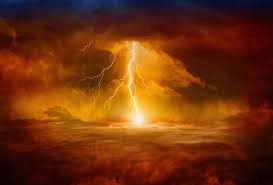God’s Determination to Punish Judah
14:1 to 17:27
609 to 598 BC during the eleven-year reign of Jehoiakim

The section of 14:1 to 15:21 is bound together by the theme of drought; physical drought that illustrates spiritual drought. First comes the heartbreaking picture of drought so severe that even the wild donkeys cannot find any grass. In other words, Y’hudah was experiencing a spiritual drought (to see link click Cj – Judah’s Terrible Drought). Once again Jeremiah is commanded by the LORD not to pray for the Judeans. The prophet interceded three times with ADONAI responding three times. Finally, God sent four destroyers to make the Jews abhorrent to all the kingdoms of the earth (see Ck – Jerusalem’s Judgment Inescapable). God’s pain is profound. Judah kept turning her back on Him and He describes her demise. God’s love lasts forever, but His patience does not. Yerushalayim’s destruction is described as if it had already occurred (see Cl – You Have Rejected Me, I am Tired of Relenting). The prophet was despondent and wishes he were never born. YHVH encourages His servant (see Cm – Woe to Me, Mother, That You Gave Me Birth).
The sixteenth chapter balances judgment and hope. More than half of the chapter (see Co – You Must Not Marry and Have Sons and Daughters) is a reflection on Jeremiah’s celibacy, which is a warning of the deprivation that would come to Y’hudah. This is followed by the promise of a return from exile (see Cp – Judgment Before Final Restoration to the Land). A warning that YHVH will send fishermen and hunters to search out Jewish idolaters from the Land is followed by the hope that finally the Gentile nations will be converted.
Chapter seventeen contrasts between life with ADONAI and life without Him. God chronicles Judah’s indelible sin and the contrast between trust in man and trust in God. The human heart is deceitful above all things and beyond cure. Then a parable is directed specifically to King Jehoiakim (see Cr – Blessed is the One Who Trusts in the LORD, Whose Confidence is in Him). Then Jeremiah issues his fifth complaint. Jeremiah asks God to save him, to rescue him, to vindicate him, from any situation because the prophet was being attacked and accused of being a false prophet (see Cs – Heal Me, ADONAI, and I Will Be Healed, Save Me and I Will Be Saved). God is always ready to forgive a repentant sinner (26:2-3). And it was the prophet’s duty to indicate the remedy for the current evils of the people. It was therefore natural that Yirmeyahu should stress the importance of Shabbat, a basic institution of Judaism. Making the Sabbath holy, with its intensive spiritual influence, would tend to wean the people from other abuses and effect a reformation (see Ct – The Sabbath and National Survival).



Leave A Comment